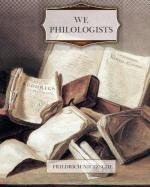And it is especially naive when Hellwald, the author of a history of culture, warns us away from all “ideals,” simply because history has killed them off one after the other.
156
To bring to light without reserve the stupidity and the want of reason in human things . that is the aim of our brethren and colleagues. People will then have to distinguish what is essential in them, what is incorrigible, and what is still susceptible of further improvement. But “Providence” must be kept out of the question, for it is a conception that enables people to take things too easily. I wish to breathe the breath of this purpose into science. Let us advance our knowledge of mankind! The good and rational in man is accidental or apparent, or the contrary of something very irrational. There will come a time when training will be the only thought.
157
Surrender to necessity is exactly what I do not teach—for one must first know this necessity to be necessary. There may perhaps be many necessities; but in general this inclination is simply a bed of idleness.
158
To know history now means . to recognise how all those who believed in a Providence took things too easily. There is no such thing. If human affairs are seen to go forward in a loose and disordered way, do not think that a god has any purpose in view by letting them do so or that he is neglecting them. We can now see in a general way that the history of Christianity on earth has been one of the most dreadful chapters in history, and that a stop must be put to it. True, the influence of antiquity has been observed in Christianity even in our own time, and, as it diminishes, so will our knowledge of antiquity diminish also to an even greater extent. Now is the best time to recognise it: we are no longer prejudiced in favour of Christianity, but we still understand it, and also the antiquity that forms part of it, so far as this antiquity stands in line with Christianity.
159
Philosophic heads must occupy themselves one day with the collective account of antiquity and make up its balance-sheet. If we have this, antiquity will be overcome. All the shortcomings which now vex us have their roots in antiquity, so that we cannot continue to treat this account with the mildness which has been customary up to the present. The atrocious crime of mankind which rendered Christianity possible, as it actually became possible, is the guilt




